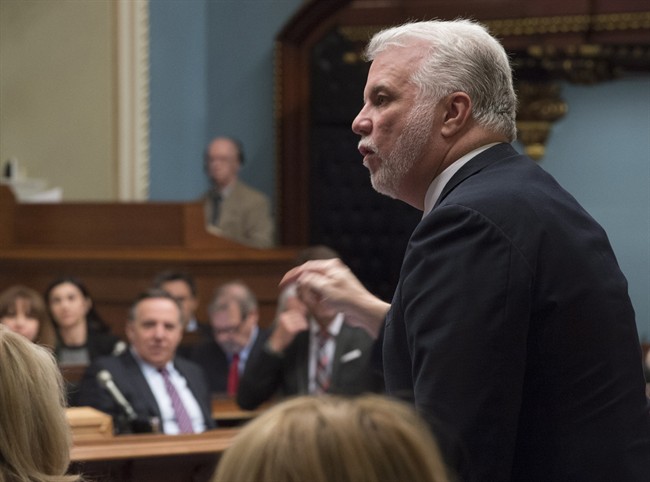Cannabis, identity politics and systemic racism are all on the menu as Quebec’s legislature resumes Tuesday after its summer recess.

With one year to go until the 2018 election, the province’s four main parties have another big task: make themselves palatable to the voting public.
“You have a good number of parties and none of them seem to please the electorate,” said Guy Lachapelle, a Concordia University political science professor.
READ MORE: Quebec politicians air their grievances at the end of session
Since the 2014 election, polls have consistently placed the governing Liberals in first place, but they remain stubbornly in minority territory and the dissent vote hasn’t coalesced behind any of the three main opposition parties, he said.
Voters are looking at how the government will legislate the control and distribution of marijuana, as Ottawa plans on making the drug legal by next summer.
The Ontario government announced earlier this month its plan to open 150 dedicated marijuana stores run by the province’s liquor control board, but it remains to be seen if Quebec will allow the private sector to get in on the action.
READ MORE: Quebec to begin consultations before tabling cannabis legislation this fall
Identity politics will loom over this legislative session as a committee continues to study the Liberals’ Bill 62, legislation that sets guidelines for accommodating religious requests in the province.
- ‘Shock and disbelief’ after Manitoba school trustee’s Indigenous comments
- Canadian man dies during Texas Ironman event. His widow wants answers as to why
- Several baby products have been recalled by Health Canada. Here’s the list
- ‘Sciatica was gone’: hospital performs robot-assisted spinal surgery in Canadian first
The justice minister’s bill attempts to enshrine into law the policy that all people giving or receiving a service from the state must do so with their face uncovered.
Public consultations are also set to begin this month on “systemic racism” in Quebec, during which community groups, activists and other citizens are expected to discuss structural barriers to the advancement of people of colour in the province.
Within this debate will be the ongoing discussion of how Haitian asylum seekers are integrating into the province, after thousands of them crossed into Quebec illegally from the U.S. since the summer.
READ MORE: ‘Illegal entry is illegal entry’: Quebec premier responds to U.S. asylum seekers
The influx of would-be refugees has triggered protests from right-wing groups demanding the province do more to stop people from migrating to Quebec.
With unemployment low and a relatively strong economy compared to other provinces, the opposition will likely attack the government this session on health care and education, the two areas that suffered deeply during the several rounds of cuts made by the government to balance the budget.
“The opposition will ask voters whether they are better off now or four years ago with regards to health care and education,” Lachapelle said.

Comments